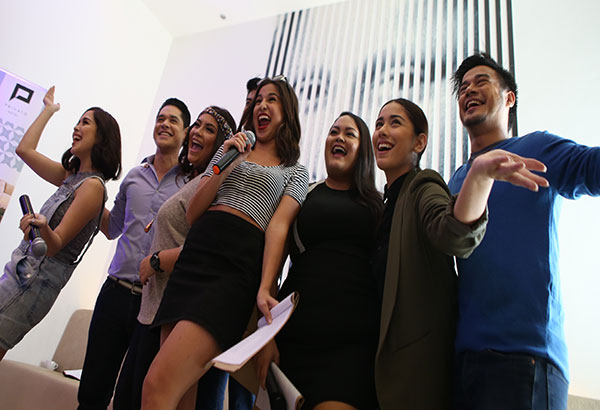‘No Filter 2.0’: More monologues, more millennials
These days, the monologue is hardly ever fully utilized. When used in theater, it’s often just to show a bit of introspection, a bit of setting up, just to be sure that the audience is on the same page. The protagonist faces the crowd and tells them his woes, as though the audience had yet to empathize with his problems. It is an exercise in redundancy that ends with a row of questions, hopes and fears, and a prompt closing of curtains. But make no mistake, the monologue is not losing relevance nor is it losing appeal among the younger generation. Those are two things No Filter proves by its very existence. And as a testament to the success of its first run, No Filter will be restaged throughout October at the Power Mac Center Spotlight (Circuit Makati), as No Filter 2.0 with three new cast members, for a total of 11 millennials sharing one stage.
“From the onset, there was always this idea of doing something like The Vagina Monologues for millennials,” says Toff de Venecia, director of the show, in our quick chat. “That was always the base idea of it.
“But we asked ourselves, what is the essence? What is the ingredient? What is the spirit of it? Well, maybe we wanted to demystify this otherwise always-bashed, always-criticized, always-judged generation-in-the-making. Parang, what is a millennial? What are they all about? What do they like? What do they not like?
“It is not just in defense of them, but also an attack on them,” he explains. “We tried to explore all of those entry points, place them into the subject matter, and see what it is that the audience would take away from it. And what we learned later on, because — again, this is a work-in-progress — is that it is actually a celebration of the millennial, warts and all.” While explaining all of this, Toff was performing a bit of calisthenics. His hands gripped tight to a railing as he stretched his legs from side to side. His arms gesticulated along with every expression, revealing not only the mix of excitement and anxiety he has for his play, but also his own youth.
Happily, Toff says, they realized that the initial run’s tagline of “A monologue series for millennials by millennials about millennials” was a “hasty generalization or a wrong assumption.”
It’s “actually just ‘about millennials,’” he says. “And in the specificity of that, we’re able to discuss the universality of what it is that they go through — that everybody else goes through, whatever the age or generation.” He tells me that, as they opened the first run, the No Filter cast and crew learned that even the non-millennials who watched the show were able to relate to it. “Either they understood their children better, or a brother better, or a family member or a friend better.”
And it does make sense. In this age of social media, there is no perspective as powerful and as widely valued as the individual’s. Online, we are encouraged — almost required, but really coerced, if you must — to use the “I” word. A whole army of “I”s at that. The self becomes a performance as we wield online personae and create different characters out of our Facebook, Twitter, Instagram, Dubsmash and other accounts. Sometimes, the various personalities we make clash with one another — often contradicting who we are in real life — and there is nothing left for us to do but to ask, “Who are we, really?” Here, the nuances of monologue find their place. And who better to use this form but the millennials, who seemingly couldn’t live or breathe without social media?
But performing a monologue is an altogether different matter.

Talent and Star Power: The Sandbox family’s show of force. Photo by JOEY MENDOZA
Cai Cortez, one of the more experienced theater actors in the cast, differentiates dialogue from monologue as a “conversation with yourself.” What, for her, makes dialogue easier than a monologue is that the energy is passed around, and you, as a receiver, only have to respond by throwing the energy back. In her own words, “In a monologue, you can only rely on yourself to keep the show going.
“The monologue has to be interesting. It has to have a peak. It has to have a conclusion. It has to have peace,” she said. “Performing a monologue, you have to color every sentence. Hindi pwedeng pare-pareho lang pagkakasabi, eh.”
The head writers for No Filter 2.0 are Wango Gallaga and Jam Pascual, a team that covers “different demographics,” according to Toff, “Wango being 36, Jam being 21, and me being 28 years old.” (As writers from this generation, they say they also made edits via Facebook.) They orchestrate a popular cast of millennials: Jasmine Curtis-Smith alternated by Sam Concepcion; Lauren Young, Saab Magalona-Bacarro, and Carla Humphries alternating one another; Cai Cortez with Sarah Facuri as alternates; Mikael Daez, Micah Muñoz, and Paolo Valenciano; and Khalil Kaimo. As a play representing this generation-in-the-making, it thrills me to see what we’re all about.















